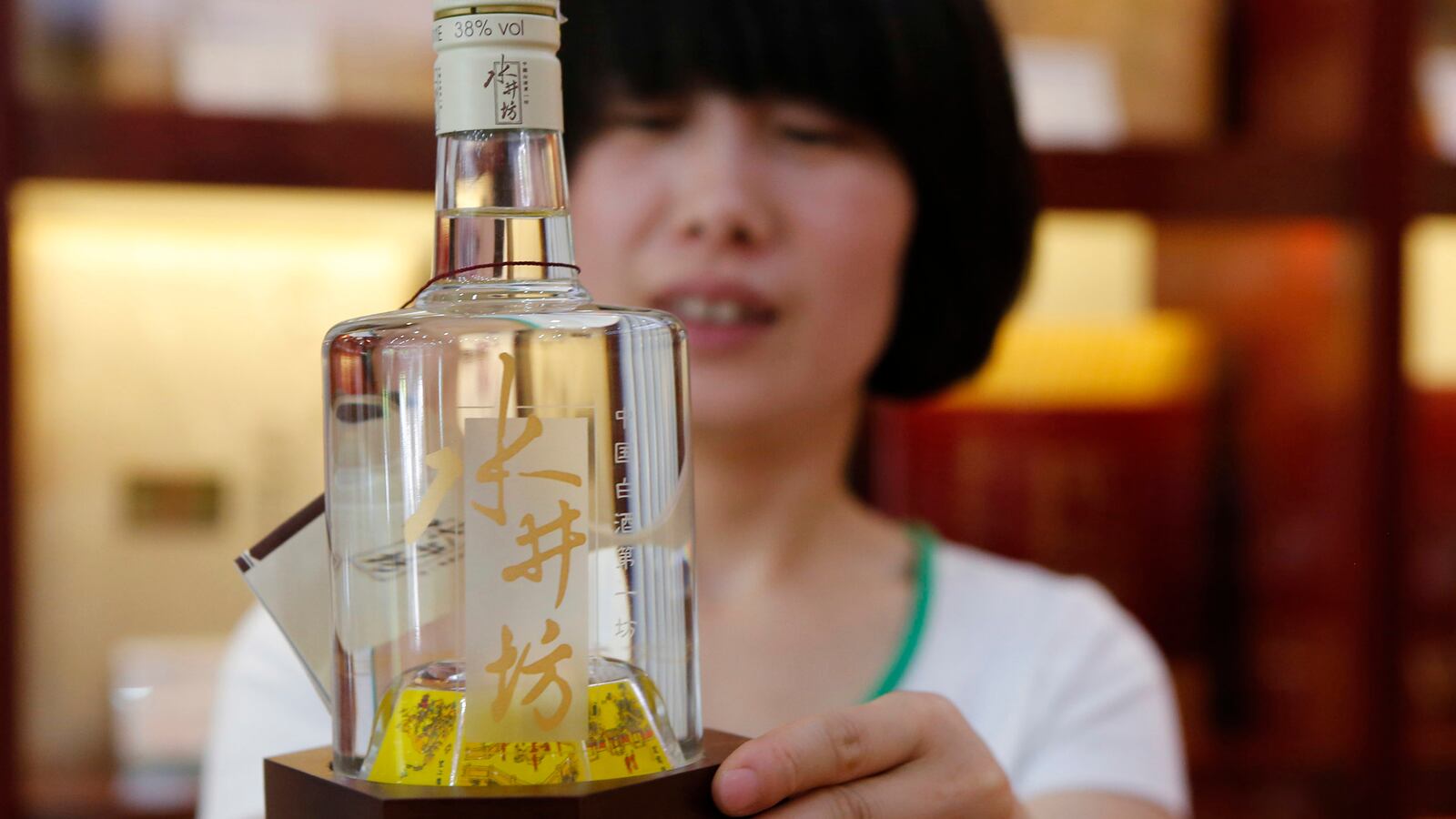In 1972, President Richard Nixon became the first U.S. president to visit the People's Republic of China in a monumental effort to open up what had been a cold relationship between the two countries. Premier Zhou Enlai and Nixon toasted the new beginning with baijiu, a drink that helped break the ice and bond the two disparate world powers when almost nothing else could. The trip was successful, despite reporter Dan Rather’s famous description of the spirit as tasting like "liquid razor blades."
No business deal in China is finalized without several small shots of baijiu (pronounced buy-joe), which is only growing in importance as China’s power in the world takes on new heights. Yet, this phenomenally popular and culturally important spirit is practically nonexistent—and largely unknown—in the western world.
"The larger problem is one of misunderstanding," Derek Sandhaus, author of Baijiu: The Essential Guide to Chinese Spirits, explains. "Baijiu has been treated as this gross thing Chinese people drink...without understanding that it is a wide category and that there are good ones out there."
Baijiu is a general Chinese term for spirits made from grains. Whiskey and vodka are also loosely classified as such, but the base of baijiu is sorghum. To demonstrate just how important the spirit is in China, take a look at the numbers. There are 14,000 baijiu distilleries in the country, according to a report by the International Wine & Spirits Group. The IWSG also reports that around 1.25 billion 9-liter cases of baijiu were consumed in 2012. To put this in perspective, the Distilled Spirits Council of the United States recorded American consumption of all spirits in 2012 at just over 1.8 billion liters. Baijiu sales were a whopping $92.4 billion in 2012—a 20 percent average annual increase since 2003. Consulting firm Frost & Sullivan projected baijiu production to soar to 17 billion liters in 2016, compared with 4.9 billion in 2007.
In a nutshell, baijiu is to China what apple pie is to America, if not even more so.
Baijiu has a long, romantic history. The spirit’s fermentation agent, qu (pronounced “chew”), was invented during the Han Dynasty around 200 A.D. to make huangjiu, or "yellow wine.” Through trade with the Middle East, the Chinese learned how to distill the wine mixture sometime between 960 and 1368 to eventually produce baijiu. The drink was stronger and cheaper than huangjiu, making it popular among farmers and workers. Baijiu's popularity spread across the country, and each province was soon making its own version. It became an important part of people's daily lives and was tied intrinsically to their sense of place, roots, and traditions.
The extremely labor intensive, artisanal production process involves fermenting a mixture of grains in brick, mud, or clay, and distilling a small batch multiple times. No other spirit is fermented more than once. Each distillery closely guards its particular strain of qu, which is incredibly sensitive to its environment, making each brand of baijiu taste different depending on its terroir. Baijiu is aged in clay for up to 30 years and blended with other batches aged for different lengths of time, but made by the same distillery. The resulting liquor is 100 proof-plus.
"The process is very specific to baijiu. We cannot really compare to any other production method of spirits in the world," says Manny Burnichon, president and CEO of Private Cask Imports. "Everything is done by hand."
Because of this, baijiu production requires a slew of well-trained employees, whereas American distilleries might be able to get by with just a few. Baijiu producers are treated like valued artisans in China. In addition, the majority of baijiu brands are owned by local and municipal governments, so citizens maintain a lot of pride for their hometown hooch.
There are three main types of baijiu categorized by their “aroma”: sauce or complex aroma (nutty, earthy flavors with a predominantly sorghum base and fermented in brick pits), strong aroma (floral, citrusy, and fruity made from sorghum, wheat, rice, sticky rice, and corn and fermented in mud pits), and light or mild aroma (neutral with a majority sorghum base, fermented in clay or stone jars). Chinese value strong and sauce aroma baijius the most.
So far, baijiu seems to be an acquired taste for Westerners. During a recent taste test of five baijiu brands, I realized just how much variety there is. I found the sauce/complex aromas hailing from Guizhou in the south of China to be most agreeable. A shot of the Moutai brand delightfully produced a toasted hazelnut flavor cloud in my mouth. The strong aroma styles, which included the Mianzhu Daqu, Jian Nan Chun, Shui Jing Fang, and Luzhou Laojiao, were a mixed bag of aromas and flavors reminiscent of strawberry, pine, tobacco, and chocolate covered blueberries, depending on the brand, and they took on pungent pisco or grappa qualities. A friend of mine summed up the overwhelming tasting experience, saying, "How are all these flavors in here? It doesn't make sense!"
"People might try one [brand] and not like it; but they vary so widely. But it would be the equivalent of trying gin and saying, 'Oh I don't like Western spirits. This is no good,'" Sandhaus says.
The Chinese have come to expect this sort of confused reaction, CNS Imports principal Steaven Chen says. And since local producers have been busy enough growing their own markets, courting Westerners hasn't been a priority. It also hasn’t been possible until the last couple decades or so, when the Chinese infrastructure improved enough to vastly widen national distribution, to say nothing of the rest of the world, Sandhaus adds.
Several Western spirits importers and producers are also trying to change the spirit’s image issue in the U.S. A couple of years ago, London-based liquor giant Diageo became a majority stakeholder in Shui Jing Fang, China's oldest distillery and baijiu producer, with the intention of bringing it abroad. Importers CNS Imports and Private Cask Imports say they now bring close to 30 baijiu brands into the U.S., but they estimate sales are currently less than 30,000 cases a year. Using public tastings, events, and seminars, CNS and Private Cask are trying to raise awareness in the general American public and popularize the spirit beyond the borders of China.
The mission is increasingly important as the U.S. relies more and more on China as a business partner and political ally, and vice versa. It isn't good enough to simply show an appreciation for the country’s most beloved spirit. Americans must also be able to keep up with their guests over several shots during a power lunch, tilting the top of the glass toward them to show that it’s empty.
And who knows? Maybe all it will take to improve foreign relations or seal that deal is just a few shots of baijiu.





